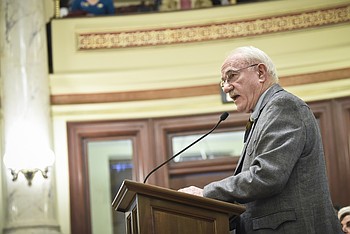Ban on transgender medical care for youth advances
MARA SILVERS Montana Free Press | Daily Inter-Lake | UPDATED 1 year, 11 months AGO
A bill to ban gender-affirming medical care for transgender minors cleared an initial vote in the Montana Senate Tuesday after an hour of intense debate and occasional rule maneuvering between lawmakers, the highest profile clash yet this session on the issue that has generated national debate in recent years.
Twenty-eight Republicans ultimately supported Senate Bill 99, overcoming the mix of 21 Democrats and Republicans who voted against the measure. The bill will need to clear another vote before the Senate this week in order to be transmitted to the House.
If it becomes law, SB 99 would penalize medical providers who provide puberty blockers, hormone therapies, or any type of surgery, such as mastectomies, for any young person seeking to align their appearance and presentation with their gender identity.
The bill would also prohibit the use of public funds, facilities and resources for gender-affirming care and bar state property or buildings from being used to promote social transitioning, such as using a minor’s chosen name and pronouns or recommending the use of gender-affirming clothing.
In comments that echoed his advocacy for similar measures in 2021, Sen. John Fuller, R-Kalispell, described his bill on Tuesday as an effort to protect children from medical procedures he said can have long-term consequences and lead to regret. The bill’s sponsor also generally cast doubt on the legitimacy of transgender people, setting the tone for Tuesday’s heated debate.
“Transgender ideology is not scientific. The idea that a child can be born into the wrong body … is a metaphysical or a spiritual dogma. There is nothing scientific about it,” Fuller said.
Nearly every Democratic senator, and one Republican, spoke in opposition to the bill, highlighting points made by close to a hundred opponents during January’s hearing before the Senate Judiciary Committee, including many transgender young people and parents of trans children.
“They shared with us how access to care actually helped them, led them to being able to live their lives in joy, in confidence and in enthusiasm,” said Sen. Andrea Olsen, D-Missoula, a member of the committee. “Who are we to deprive our constituents of their self-determination? Strip them of their access to live their lives fully in the pursuit of happiness?”
Other Republican members who sit on the Judiciary Committee spoke in favor of the bill, suggesting that medical providers shouldn’t “further encourage dissociation from reality” by affirming a young person’s gender identity and that transgender patients and their families would be better off waiting to seek such services until they become legal adults.
“The sponsor of the bill talked about underage prohibitions such as alcohol, marijuana, gun sales and tobacco. Wait till you’re 18. There should be an underage prohibition on transitioning as well,” said Sen. Keith Regier, R-Kalispell.
Opponents sought to puncture those arguments, referencing research studies that show access to gender-affirming care helps decrease the risks of suicide among young people who might feel misunderstood and unaccepted. Sen. Kathy Kelker, D-Billings, told fellow lawmakers that those findings are the reason why the nation’s leading health care organizations recommend gender-affirming care as an option for patients in consultation with family members and other medical providers.
“At the simplest level, just allowing kids to express their gender the way they choose decreases rates of anxiety and depression to normal levels,” Kelker said. “… Prohibiting young people and their parents the opportunity to use medical treatment that works — it is not a neutral act. Withholding medically necessary care, as is in the bill, SB 99, would cause harm and greatly increase health risks for some transgender youth.”
In addition to trading talking points, Democratic and Republican lawmakers repeatedly clashed over proper language and legislative decorum during Tuesday’s debate. Minority Leader Pat Flowers, D-Belgrade, rebuked Republican lawmakers for rhetorically comparing gender-affirming mastectomies, which rarely occur for minors in Montana, to adult amputations and lobotomies.
At another point, Fuller spoke out of turn in response to comments made by Sen. Ellie Boldman, D-Missoula, accusing her of misrepresenting his record on a separate bill considered by the Senate last week. Fuller later apologized for the outburst.
The most notable breach of procedure came after opponents attempted to sideline SB 99 through a motion to “indefinitely postpone” consideration of the bill. Flowers brought the motion after debate had finished and Fuller had made his final remarks, prompting Senate Majority Leader Steve Fitpatrick, R-Great Falls, to call the maneuver improper.
“Senator, all due respect, you’re out of order. Once the motion, once it closes, we have to go to the vote,” Fitzpatrick said.
Flowers disagreed with that interpretation, asking for the Senate to stand at ease while lawmakers on the Rules Committee convened in the center of the chamber floor. After roughly four minutes, the group dispersed. Addressing the chamber, Flowers withdrew his motion but reiterated that the parties’ leadership had conflicting readings of the allowable procedure.
Opponents of the bill had hoped that the motion to shelve SB 99 would attract adequate support from moderate Republicans. Instead, only five GOP lawmakers joined Democrats in voting against the measure, allowing the bill to clear the hurdle with a seven-vote margin.
Reporter Mara Silvers can be reached at msilvers@montanafreepress.org. The Montana Free Press is a Helena-based nonprofit newsroom. To read the article as originally published, click here.



